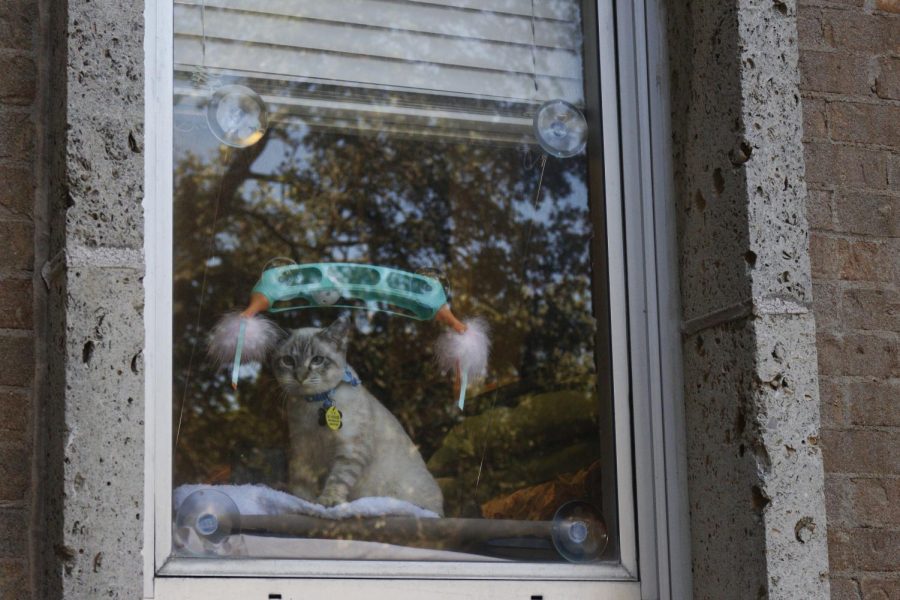Some students live with emotional support animals in dorms to help with mental health struggles
October 7, 2021
Editor’s Note: This article first appeared as part of the October 1 flipbook.
Hedgehogs and cats are helping students in dormitories get out of bed in the morning and face the day during the pandemic.
College students have greater rates of depression than other age groups, which emotional support animals can alleviate by providing companionship, said Miki Tesh, a licensed clinical social worker who registers people’s pets as emotional support animals. Tesh said animal adoption rates are increasing due to COVID-19 as more people look for ways to deal with isolation.
Jolie Royal, a health and society and social work sophomore, lives in Jester East Residence Hall with her 9-month-old cat, Dewdrop.
Royal said she is diagnosed with depressive disorder and generalized anxiety disorder. Royal said taking care of Dewdrop helps her when she lacks the motivation to get up or when she is anxious about leaving the dorm.
“I had a problem with suicidal ideation, and just having that responsibility, knowing that another living animal is depending on me, is really helpful,” Royal said. “If I wasn’t here, who would take care of him? So I really can’t overstate how much it helps.”
Royal said she considers Dewdrop her family and checks in on him in between classes to make sure he is okay.
“We have a great friendship,” Royal said. “I call him my son. I call him from across the room, ‘My beloved, my son,’ so he’s like family to me.”
Government freshman Shefali Rao also lives in Jester East with her 6-month-old hedgehog Carl. Rao said her depression can also make it difficult to get out of bed sometimes, but her responsibility to look after Carl motivates her.
“He really makes me feel like I have a purpose in my life even if that’s kind of cheesy,” Rao said. “(Carl’s) literally so cute, I get so excited every time he wakes up, like every single time, I’m like, ‘You are so cute’ and he rattles around, and it’s just adorable.”
Rao said taking a break from homework or other college stressors to play with Carl is therapeutic.
To keep an emotional support animal in the dorms, non-University licensed healthcare provider must verify that a student needs one. Students then present the document in addition to a request form to the SSD and wait to find out if the University will allow the student to keep the animal.
Royal said the verification process is complicated and she did not understand why an outside psychiatrist had to verify having an emotional support animal.
“I know they have psychiatrists who work for the (Counseling and Mental Health Center), and they’ll give you medication, but they can’t just sign a paper (to grant an emotional support animal),” Royal said. “It was really confusing to me.”
Tesh said she recommends students book three appointments a week apart to assess their mental health. Tesh said the total cost for the three appointments and sending the documents to the University is $300.
However, other options are also available. Royal got her animal certified through one phone call.
“Everyone can benefit from having any type of emotional support animal,” Rao said. “College is super stressful, and I feel like having that companionship with an animal is beneficial.”
Editor’s Note: An earlier version of this story falsely described Miki Tesh’s occupation as psychiatrist. The story has since been corrected to say Tesh is a licensed clinical social worker. An earlier version of this story also stated that a non-University psychiatrist must verify if a student needs an emotional support animal in their dorm and that students must present documentation to the University and wait to find out if the University will allow the student to keep the animal. The story has since been corrected to say a non-University licensed healthcare provider must verify the student’s needs and that students must present documentation in addition to a request form to SSD before waiting to find out if the University will allow the student to keep the animal. The Texan regrets these errors.












